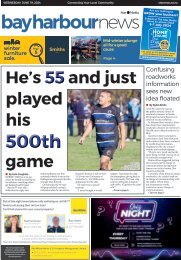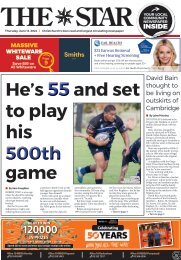The Star: March 26, 2020
You also want an ePaper? Increase the reach of your titles
YUMPU automatically turns print PDFs into web optimized ePapers that Google loves.
SPORT 21<br />
Ellis pulls stumps<br />
local sport<br />
Proudly brought to you by...<br />
Thursday <strong>March</strong> <strong>26</strong> <strong>2020</strong> <strong>The</strong> <strong>Star</strong><br />
Tower JuncTion<br />
Phone: 348 6020 Open 7 days 11am to late www.speightstowerjunction.co.nz<br />
on long and successful career<br />
• By Gordon Findlater<br />
Canterbury’s longestserving<br />
cricketer called<br />
stumps on an 18-yearcareer<br />
last week. Sports<br />
reporter Gordon Findlater<br />
caught up with all-rounder<br />
Andrew Ellis to reflect<br />
on his career and how<br />
he hopes to help more<br />
athletes succeed in his<br />
next journey.<br />
ANDREW ELLIS’ career in<br />
red and black started with him<br />
breaking a Canterbury record.<br />
<strong>The</strong> record for the side’s largest<br />
first-class 9th wicket partnership<br />
of 115 with Gareth Hopkins was<br />
just scratching the surface.<br />
<strong>The</strong> all-rounder has gone<br />
on to entrench his name in<br />
Canterbury’s cricket history<br />
while becoming just the second<br />
player in New Zealand domestic<br />
cricket to play more than 100<br />
games in each format – including<br />
117 T20 matches, 109 List A<br />
matches, and 105 first-class<br />
matches.<br />
Growing up in Dallington,<br />
Ellis played his youth cricket<br />
for East Shirley and was one of<br />
many players to come through<br />
under the guidance of coach Bill<br />
Duncan. Sport was a constant<br />
in his life from an early age.<br />
His father Malcolm Ellis hosted<br />
an afternoon sports show on<br />
Newstalk ZB for two decades.<br />
“I used to get around with him<br />
on a Saturday afternoon. At that<br />
time, before he did it from the<br />
studio, he would be around all<br />
the grounds reporting all the<br />
club sport,” said Ellis.<br />
<strong>The</strong> right-arm paceman played<br />
first XI cricket at Shirley Boys’<br />
High School and made a natural<br />
transition to senior cricket with<br />
Easts. However, at the time<br />
cricket wasn’t the only sport he<br />
was playing at a premier club<br />
level. During the winter Ellis<br />
played football for Rangers.<br />
Before dedicating himself purely<br />
to cricket Ellis made three<br />
national league appearances for<br />
Canterbury United in 2003. <strong>The</strong><br />
team at the time featured Danny<br />
Halligan as a player-coach and<br />
Ben Sigmund.<br />
His debut for Canterbury<br />
United came just months after<br />
his first-class cricket debut<br />
against Auckland at Colin<br />
Maiden Oval in February 2003.<br />
Ellis remembers claiming his<br />
first wicket by dismissing Tim<br />
McIntosh LBW. However, he says<br />
his first scalp should have been<br />
one of the big names in cricket –<br />
Mark Richardson.<br />
“He [Richardson] was stone<br />
dead in front, but was given not<br />
out. <strong>The</strong>n I think Tim McIntosh<br />
wore the brunt of an umpiring<br />
make-up call. He was probably<br />
wearing his black helmet at the<br />
time, so the umpires were a bit<br />
STALWART: Andrew Ellis represented Canterbury 331 times<br />
across all three formats during his 18-year professional<br />
career. <br />
reluctant to stick their finger up.”<br />
Later in the match, Ellis and<br />
wicket-keeper Gareth Hopkins<br />
combined for a record ninthwicket<br />
partnership of 115.<br />
Batting at No 10 at the time,<br />
Ellis was a far different batsman<br />
to the explosive middle-order<br />
threat he became later in his<br />
career.<br />
“I was pretty cautious back<br />
then. I had a good defence, but<br />
lacked the audacity to go outside<br />
of that.”<br />
His rise to become a genuine<br />
all-rounder involved switching<br />
club and changing his mindset<br />
to become more aggressive. Ellis<br />
also says a successful surgery<br />
in 2010 after a long battle with<br />
stress fractures in his back played<br />
a major role in the development<br />
of his game.<br />
“At East Shirley I was batting<br />
five or six, but would hardly<br />
get a bat because we were so<br />
dominant. We had the Papps<br />
brothers opening the batting,<br />
Neil Broom and the Pawson<br />
brothers. Because we were so<br />
dominant as a team I’d come<br />
in with 10 overs to go, so I<br />
made the tough call to move<br />
clubs and open the batting,”<br />
said Ellis.<br />
“<strong>The</strong>re was a lot of work I had<br />
to do on the mental side of it.<br />
That probably culminated in<br />
having surgery, which got my<br />
back sorted and gave me a real<br />
security in myself<br />
“I always thought I needed to<br />
have this mental restriction on<br />
myself to score runs. Things just<br />
grew from there. Bob Carter<br />
played a big part in that by<br />
basically forcing me to take risks<br />
and push me out of my comfort<br />
zone mentally.<br />
“<strong>The</strong> technical stuff was there<br />
because I had done so much<br />
work, but it was those coaches<br />
and Bob’s words around ‘if you<br />
don’t those risks and take this<br />
approach then you won’t make<br />
it, there’s no chance of success’.<br />
When it was laid down black<br />
and white like that for me I knew<br />
what I had to do and it sort of<br />
snowballed.”<br />
<strong>The</strong> new approach saw Ellis<br />
go onto score nine first-class<br />
centuries. Impressive displays<br />
at provincial level also saw him<br />
represent New Zealand in 15<br />
one-day-internationals and<br />
five T20 internationals in 2012<br />
and 2013. However, Ellis says<br />
the biggest highlights of his<br />
career came in his five Plunket<br />
Shield four-day title-winning<br />
campaigns with Canterbury<br />
in 2007/08, 2010/11, 2013/14,<br />
2014/15 and 2016/17.<br />
THE NUMBERS:<br />
First-class: 5221 runs at an average of of 35.17<br />
and 249 wickets at an average of 29.78.<br />
List A: 2708 runs at an average of 31.85<br />
and 154 wickets at an average of 29.84.<br />
T20: 1258 runs at an average of 17.00<br />
and 131 wickets at an average of 22.93.<br />
BIG STAGE: Ellis represented New Zealand in 15 one-dayinternationals<br />
and five T20 internationals in 2012 and 2013.<br />
“Nothing can replace the<br />
feeling of working over a six<br />
month season. Getting to the end<br />
and winning that Plunket Shield<br />
was the pinnacle. That was the<br />
vindication of all that work. <strong>The</strong><br />
four-day game was always the<br />
true test of cricket – mentally,<br />
technically and the whole piece<br />
as a person. To come out with<br />
five of those titles in a career is a<br />
huge highlight.”<br />
Arguably the most impressive<br />
of the lot came in 2010/11.<br />
Following the February 22<br />
earthquake, the side still had<br />
six Plunket Shield matches<br />
remaining in their season. <strong>The</strong><br />
side made the decision to soldier<br />
on and went undefeated for the<br />
remainder of the campaign.<br />
“I don’t know how we did it.<br />
Like everyone at that time we<br />
were in a daze just trying to work<br />
out what was happening in our<br />
own personal world and trying<br />
to play cricket. We were out there<br />
like everyone else shovelling<br />
liquefaction,” said Ellis<br />
“I’m immensely proud of what<br />
that team achieved during that<br />
time. I know everyone that was<br />
a part of that probably changed<br />
forever, in how they saw their<br />
cricket and the team, probably in<br />
a positive way.<br />
“We realised what resilience<br />
was. We had that successful<br />
period in four-day cricket after<br />
that. It was the start and who<br />
knows, it may have been a huge<br />
part of that. We knew that we<br />
could withstand any challenge<br />
that was thrown at us as a team<br />
after that. <strong>The</strong>re were guys like<br />
Toddy [Todd Astle] and Fults<br />
[Peter Fulton] who were the<br />
spine of the team and each had<br />
different earthquake experiences,<br />
but we were able to take that<br />
resilience for guys that came<br />
in and out of the team and let<br />
them know this is the way we do<br />
things in Canterbury and this is<br />
the way we play our cricket. That<br />
culminated in a pretty successful<br />
four-day team.”<br />
After making the decision<br />
to pull stumps on his playing<br />
career, Ellis will remain<br />
heavily involved with sport<br />
in his new role as the regional<br />
manager for Christchurch at<br />
High Performance Sport New<br />
Zealand. After previously trying<br />
his hand at sales he admits the<br />
transition to life after cricket has<br />
come with its challenges.<br />
“It was challenging to be<br />
honest and harder than I<br />
thought it was going to be from<br />
a logistical point of view as<br />
well as a mental point of view,<br />
but it was an inevitable time,”<br />
he said.<br />
“You’ve got to find a job that<br />
gives you that same sense of<br />
fulfillment and that same sense<br />
of pushing yourself, and that’s<br />
pretty tough to do. It’s not just<br />
the food on the table, but how do<br />
I find a job I loved as much as my<br />
previous job.”<br />
With cricket now on the back<br />
burner, Ellis also confirmed a<br />
return to the football pitch is a<br />
very high possibility sometime<br />
in the future.


















